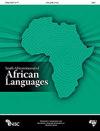Khelobedu是一种语言还是一种方言?
IF 0.4
0 LANGUAGE & LINGUISTICS
引用次数: 1
摘要
本文的主要目的是调查凯洛贝杜语是否应被视为一种语言,或者它是否被正确地归类为《南非共和国宪法》第6(1)条中提到的塞佩迪语方言之一,即南非11种官方语言之一的塞佩迪语。这篇文章是由一场围绕南非方言和语言政治的方言争议引发的。方言学作为一个概念框架被认为是指导本文并支持作者观点的理论主体。这篇文章纯粹是定性的,采用了内容分析,辅以对Modjadji传统委员会成员的焦点小组采访,以及对20名自称俾路支人的大学生的面对面采访。这篇文章的参与者是根据他们对Creswell和Creswell所阐述的研究现象的熟练程度和知识而有目的地选择的。本文根据凯洛贝杜语和塞佩迪语在词汇上的不同,得出结论:凯洛贝都语不是一种方言,而是一种独立的语言。调查结果表明,将Khelobedu归类为塞佩迪方言的决定是为了适应种族隔离政权的行政制度,这纯粹是一种政治活动,缺乏透明度、协商和语言依据。研究进一步发现,关于言语形式是否构成独立语言或方言的决定是基于语言意识形态,而不是基于语言标准。本文章由计算机程序翻译,如有差异,请以英文原文为准。
Is Khelobedu a language or a dialect?
The primary aim of this article is to investigate whether Khelobedu should be considered a language in its own right or whether it has correctly been classified as one of the dialects of Sepedi, referred to in Section 6(1) of the Constitution of the Republic of South Africa, as Sepedi, one of the 11 official languages of South Africa. The article was initiated by a dialectal controversy surrounding the politics of dialects and languages in South Africa. Dialectology as a conceptual framework was considered as the body of theory that guides this article and buttresses the authors’ point of view. The article is purely qualitative in nature and employed content analysis supplemented by focus group interviews with members of the Modjadji Traditional Council and face-to-face interviews with 20 university students who ethnically identified themselves as Balobedu. Participants for the article were purposively selected based on their proficiency and knowledge about the researched phenomenon as articulated by Creswell and Creswell. Based on lexical dissimilarities realised between Khelobedu and Sepedi, the article concludes that Khelobedu is not a dialect, but a language on its own. The findings reveal that the decision to classify Khelobedu as a dialect of Sepedi was meant to accommodate the administrative system of the apartheid regime, being a purely political exercise which lacked transparency, consultation and a linguistic justification. It is further found that decisions about whether speech forms constitute an independent language or a dialect are based on language ideology and not on linguistic criteria.
求助全文
通过发布文献求助,成功后即可免费获取论文全文。
去求助
来源期刊

South African Journal of African Languages
LANGUAGE & LINGUISTICS-
CiteScore
0.50
自引率
0.00%
发文量
30
期刊介绍:
The South African Journal of African Languages is a peer-reviewed research journal devoted to the advancement of African (Bantu) and Khoi-San languages and literatures. Papers, book reviews and polemic contributions of a scientific nature in any of the core areas of linguistics, both theoretical (e.g. syntax, phonology, semantics) and applied (e.g. sociolinguistic topics, language teaching, language policy), and literature, based on original research in the context of the African languages, are welcome. The journal is the official mouthpiece of the African Language Association of Southern Africa (ALASA), established in 1979.
 求助内容:
求助内容: 应助结果提醒方式:
应助结果提醒方式:


